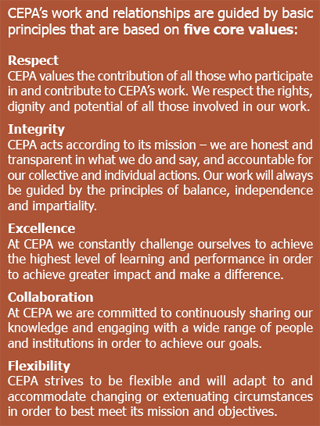CEPA at a Glance
CEPA was established in May 2001 as an independent organisation providing professional services on poverty related development issues. CEPA is registered as a non-profit company under the Companies Act 17 of 1982, Section 21. The ownership of the organisation lies with the Subscribing Members who elect the Board of Directors, CEPA’s governing body, during the Annual General Meeting (AGM).
CEPA carries out a range of client services – advisory services, applied services, dialogue and exchange and training – aimed at increasing poverty targeting and impacts of policies, projects and programmes administered by development agencies ranging from multilateral and bilateral donors, international and local NGOs, and Government. In addition to market services, CEPA also carries out independent, long term research based on assessed priorities and interest areas. Chapter 3 in this report provides details of the client services and programme activities undertaken in 2008.
Core Beliefs
CEPA believes that poverty is an injustice that should be overcome and that overcoming poverty involves changing policies and practices nationally and internationally, as well as working with people living in poverty.
Mission
CEPA’s mission is to be the leading organisation providing independent analysis of poverty, shaping policy in Sri Lanka and the region.
CEPA’s objectives are to:
• Provide independent analysis on the causes, characteristics and impacts of poverty • Share specialist knowledge and experience with development organisations and other development actors at the local and international level
• Contribute to policy dialogue and help determine poverty oriented policy, at all levels of decision-making
• Influence the mainstream development discourse and highlight related cross-cutting issues
• Be a local and regional hub for learning and sharing knowledge on development and poverty.
Ultimately, CEPA strives to contribute to influencing poverty related development policy, at the national, regional, sectoral, programme and project levels.
| 